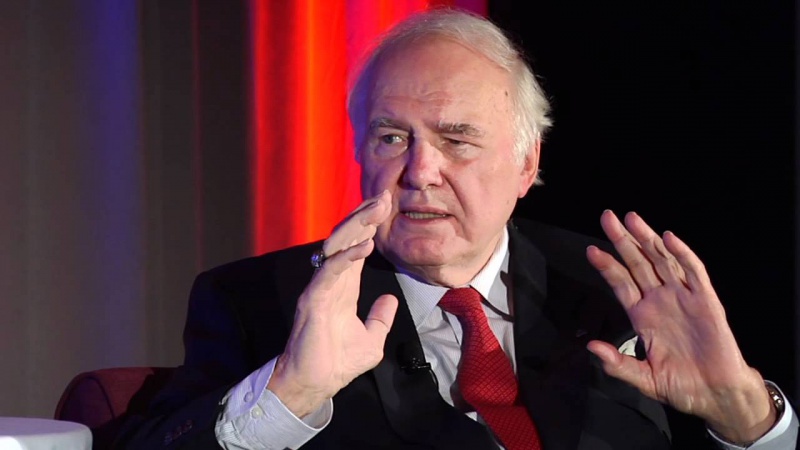Capitalism, it is usually assumed, flowered around the same time as the Enlightenment–the eighteenth century–and, like the Enlightenment, entailed a diminution of organized religion. In fact, the Catholic Church of the Middle Ages was the main locus for the first flowerings of capitalism. Max Weber located the origin of capitalism in modern Protestant cities, but today’s historians find capitalism much earlier than that in rural areas, where monasteries, especially those of the Cistercians, began to rationalize economic life.
It was the church more than any other agency, writes historian Randall Collins, that put in place what Weber called the preconditions of capitalism: the rule of law and a bureaucracy for resolving disputes rationally; a specialized and mobile labor force; the institutional permanence that allows for transgenerational investment and sustained intellectual and physical efforts, together with the accumulation of long-term capital; and a zest for discovery, enterprise, wealth creation, and new undertakings.
The Protestant Ethic without Protestantism
The people of the high Middle Ages (1100—1300) were agog with wonder at great mechanical clocks, new forms of gears for windmills and water mills, improvements in wagons and carts, shoulder harnesses for beasts of burden, the ocean-going ship rudder, eyeglasses and magnifying glasses, iron smelting and ironwork, stone cutting, and new architectural principles. So many new types of machines were invented and put to use by 1300 that historian Jean Gimpel wrote a book in 1976 called The Industrial Revolution of the Middle Ages.
Without the growth of capitalism, however, such technological discoveries would have been idle novelties. They would seldom have been put in the hands of ordinary human beings through swift and easy exchange. They would not have been studied and rapidly copied and improved by eager competitors. All this was made possible by freedom for enterprise, markets, and competition–and that, in turn, was provided by the Catholic Church.
The church owned nearly a third of all the land of Europe. To administer those vast holdings, it established a continent-wide system of canon law that tied together multiple jurisdictions of empire, nation, barony, bishopric, religious order, chartered city, guild, confraternity, merchants, entrepreneurs, traders, et cetera. It also provided local and regional administrative bureaucracies of arbitrators, jurists, negotiators, and judges, along with an international language, “canon law Latin.”
Even the new emphasis on clerical celibacy played an important capitalist role. Its clean separation between office and person in the church broke the traditional tie between family and property that had been fostered by feudalism and its carefully plotted marriages. It also provided Europe with an extraordinarily highly motivated, literate, specialized, and mobile labor force.
The Cistercians, who eschewed the aristocratic and sedentary ways of the Benedictines and, consequently, broke farther away from feudalism, became famous as entrepreneurs. They mastered rational cost accounting, plowed all profits back into new ventures, and moved capital around from one venue to another, cutting losses where necessary, and pursuing new opportunities when feasible. They dominated iron production in central France and wool production (for export) in England. They were cheerful and energetic. “They had,” Collins writes, “the Protestant ethic without Protestantism.”
Being few in number, the Cistercians needed labor-saving devices. They were a great spur to technological development. Their monasteries “were the most economically effective units that had ever existed in Europe, and perhaps in the world, before that time,” Gimpel writes.
Thus, the high medieval church provided the conditions for F. A. Hayek’s famous “spontaneous order” of the market to emerge. This cannot happen in lawless and chaotic times; in order to function, capitalism requires rules that allow for predictable economic activity. Under such rules, if France needs wool, prosperity can accrue to the English sheepherder who first increases his flock, systematizes his fleecers and combers, and improves the efficiency of his shipments.
In his 1991 Encyclical Letter Centesimus Annus, Pope John Paul II points out that the main cause of the wealth of nations is knowledge, science, know-how, discovery–in today’s jargon, “human capital.” Literacy and study were the main engines of such medieval monasteries; human capital, moral and intellectual, was their primary economic advantage.
The pope also praises the modern corporation for developing within itself a model of relating the gifts of the individual to the common tasks of the firm. This ideal, too, we owe to the high medieval religious orders, not only the Benedictines and the Cistercians, but the Dominicans and Franciscans of the early thirteenth century.
Jump-Starting a Millennium of Progress
The new code of canon law at the time took care to enshrine as a legal principle that such communities, like cathedral chapters and monasteries before them, could act as legal individuals. As Collins points out, Pope Innocent IV thereby won the sobriquet “father of the modern learning of corporations.” In defending the rights of the new Franciscan and the Dominican communities against the secular clergy and lay professors at the University of Paris, Thomas Aquinas wrote one of the first defenses of the role of free associations in “civil society” and the inherent right of people to form corporations.
The Catholic Church’s role helped jump-start a millennium of impressive economic progress. In ad 1000, there were barely two hundred million people in the world, most of whom were living in desperate poverty, under various tyrannies, and subject to the unchecked ravages of disease and much civic disorder. Economic development has made possible the sustenance now of more than six billion people–at a vastly higher level than one thousand years ago, and with an average lifespan almost three times as long.
No other part of the world outside Europe (and its overseas offspring) has achieved so powerful and so sustained an economic performance, raised up so many of the poor into the middle class, inspired so many inventions, discoveries, and improvements for the easing of daily life, and brought so great a diminution of age-old plagues, diseases, and ailments.
The economic historian David Landes, who describes himself as an unbeliever, points out that the main factors in this great economic achievement of Western civilization are mainly religious:
• the joy in discovery that arises from each individual being an imago Dei called to be a creator;
• the religious value attached to hard and good manual work;
• the theological separation of the Creator from the creature, such that nature is subordinated to man, not surrounded with taboos;
• the Jewish and Christian sense of linear, not cyclical, time and, therefore, of progress; and
• respect for the market.
Capitalism Infused with Caritas
As the world enters the third millennium, we may hope that the church, after some generations of loss of nerve, rediscovers its old confidence in the economic order. Few things would help more in raising up all the world’s poor out of poverty. The church could lead the way in setting forth a religious and moral vision worthy of a global world, in which all live under a universally recognizable rule of law, and every individual’s gifts are nourished for the good of all.
I believe this is what the pope has in mind when he speaks of a “civilization of love.” Capitalism must be infused by that humble gift of love called caritas, described by Dante as “the Love that moves the Sun and all the stars.” This is the love that holds families, associations, and nations together. The current tendency of many to base the spirit of capitalism on sheer materialism is a certain road to economic decline. Honesty, trust, teamwork, and respect for the law are gifts of the spirit. They cannot be bought.














